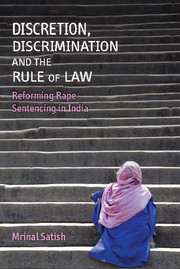Book contents
- Frontmatter
- Dedication
- Contents
- Acknowledgements
- Abbreviations
- 1 Introduction
- 2 An Introduction to the Indian Criminal Justice System
- 3 The Law and Practice of Rape Adjudication in India
- 4 Rape Sentencing: An Empirical Analysis
- 5 Myths and Stereotypes in Rape Prosecutions
- 6 Structuring Sentencing Discretion: Guideline Models and Approaches
- 7 Sentencing Discretion in India: The Need for Structuring
- 8 Sentencing Guidelines for Rape
- Appendix 1 List of Cases Studied for Empirical Analysis
- Appendix 2 Templates of Format Used for Medical Examination of Rape Victims
- Appendix 3 Overview of Variables Considered for Empirical Study and Data Obtained
- Appendix 4 Output of Regression Analysis
- Appendix 5 Charts
- Table of Cases
- Bibliography
- Index
3 - The Law and Practice of Rape Adjudication in India
Published online by Cambridge University Press: 23 July 2017
- Frontmatter
- Dedication
- Contents
- Acknowledgements
- Abbreviations
- 1 Introduction
- 2 An Introduction to the Indian Criminal Justice System
- 3 The Law and Practice of Rape Adjudication in India
- 4 Rape Sentencing: An Empirical Analysis
- 5 Myths and Stereotypes in Rape Prosecutions
- 6 Structuring Sentencing Discretion: Guideline Models and Approaches
- 7 Sentencing Discretion in India: The Need for Structuring
- 8 Sentencing Guidelines for Rape
- Appendix 1 List of Cases Studied for Empirical Analysis
- Appendix 2 Templates of Format Used for Medical Examination of Rape Victims
- Appendix 3 Overview of Variables Considered for Empirical Study and Data Obtained
- Appendix 4 Output of Regression Analysis
- Appendix 5 Charts
- Table of Cases
- Bibliography
- Index
Summary
Introduction
Chapter XVI of the Indian Penal Code (IPC) deals with offenses committed against the human body. Prior to its amendment in 2013, the sub-chapter on ‘Sexual Offences’ consisted of six provisions (Sections 375 to 376D), which defined rape and aggravated rape, along with other sex offences. Before dealing with sentencing in rape in Chapter 4, in this chapter I shall discuss the substantive and procedural laws concerning rape, as well as the Supreme Court of India's jurisprudence on these laws. I shall also discuss the Court's jurisprudence on the evidentiary requirements to prove the offence in a trial. The chapter is divided into three parts. Section II deals with the statutory framework governing the offence of rape. Section III discusses key issues that have arisen in the context of proving rape. I will demonstrate how, in response to a scathing attack against its rape decisions of the late 1970s, the Supreme Court attempted to advance a gender-sensitive approach to rape adjudication, but ironically ended up constructing a stereotypical rape victim. In Section IV, in discussing the role of medical evidence in rape prosecutions, I argue that even though the Court and the Legislature subsequently recognized the presence of stereotypical constructs in rape law, and invalidated them, ‘objective’ indices like medical examination continue to reinforce stereotypical notions of chastity and virginity in rape adjudication. This will form the framework for my next chapter, where I argue that due to reforms in rape law, the site of stereotyping merely shifted from the more visible guilt adjudication phase of the trial to the less visible sentencing phase, resulting amongst other reasons, in widespread disparity in sentencing of rape offenders.
Statutory Framework
Rape
Section 375 of the IPC defines the offence of ‘Rape’. Prior to its amendment in 2013, a man committed rape if he had sexual intercourse with a woman, under six circumstances. These circumstances were
• First, intercourse with a woman, against her will.
• Second, intercourse with a woman without her consent.
• Third, intercourse with a woman with her consent, where such consent had been obtained by putting the woman or any person ‘she is interested in’, in fear of death or hurt.
- Type
- Chapter
- Information
- Discretion, Discrimination and the Rule of LawReforming Rape Sentencing in India, pp. 34 - 60Publisher: Cambridge University PressPrint publication year: 2016



